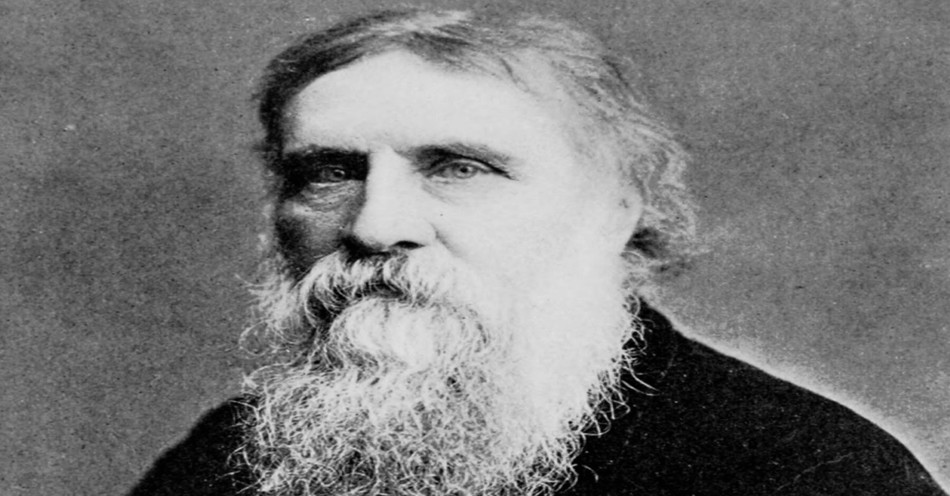George MacDonald was the pioneer of modern fantasy. Influenced by his Scottish storytelling culture and Christian background, he created books that encouraged imagination. While his name might not be as well known, he went on to inspire two of the most famous fantasy writers of all time—J. R. R. Tolkien and C.S. Lewis.
Who Was George MacDonald?
George MacDonald was born in 1824 in Hunley, Scotland. Growing up in an environment where storytelling abounded inspired him to love the craft. On the other hand, England was expanding amid the Industrial Revolution. Many of its stories and folklore faded. People moved to busy cities, and the lower class didn’t have access to education (unlike MacDonald’s Scottish upbringing, where schools were open in every parish).
MacDonald’s mother died when he was very young, so he lived with his father and uncle. These two men loved all kinds of stories and literature. He also grew up in a strongly Calvinist environment, giving him a solid foundation of Bible stories. Biographers mention thirteen-year-old MacDonald climbing on top of a table to tell stories and give sermons to farm staff. He had a strong understanding of both Christ and culture.
When he reached university age, MacDonald went to Aberdeen, where he hoped to study science. However, he didn’t have the funds to afford the education, so he moved to London as a tutor. While there, he was encouraged to attend seminary and started listening to the lectures of A.J. Scott, who encouraged the importance of storytelling. MacDonald decided he ultimately wanted to share stories with the world but took a position at a church in Arundel in the meantime.
MacDonald spent time preaching at the church, but some of his views made him unfavorable at the pulpit. He struggled with the idea of hell and damnation and suggested everyone might receive God’s grace in the end. While never fired, his salary was reduced, and he could no longer support his family on his lessening wages. Because of this, his family moved to Tastings, where he wrote his first fairytale, Phantastes.
The novel became very popular, especially with younger generations. In the Victorian period, where many lived in cramped and polluted cities, an escape to a fantastical land was welcomed. MacDonald supported his family with his writings, including poetry, novels for adults, and theological works. His fairytales fared better than his other books, including The Golden Key and The Princess and the Goblin. He wrote his last fairytale, Lilith, in 1895 and died ten years later, leaving a pathway for future fantasy writers.
10 Important Events in George MacDonald’s Life
1824: Geroge MacDonald is born in Hunley, Scotland, into a middle-class family.
1832: His mother dies, leaving him under the influence of his loving father and strict grandmother. These influences begin to form his theology.
1848: MacDonald attends Highbury Theological College, where he studies to become a minister and secures his theological principles.
1851: He becomes minister of a church in Arundel, England.
1853: MacDonald resigns after preaching controversial topics.
1855: He publishes his first literacy work, Within and Without, a romantic poem.
1858: He releases his first work of fantasy, Phantastes.
1867: He publishes The Golden Key.
1872: He releases The Princess and the Goblin.
1905: MacDonald dies after battling an illness and having lung disease for most of his life.
10 Important Quotes by George MacDonald
George MacDonald held strong beliefs that he shared during his short time at the pulpit and through his writing. Here is a list of quotes from George MacDonald taken from his many works.
“It may be an infinitely less evil to murder a man than to refuse to forgive him. The former may be the act of a moment of passion: the latter is the heart’s choice.”
―George MacDonald, Unspoken Sermons: Series I, II, III
“I do not say we are called upon to dispute and defend the truth with logic and argument, but we are called upon to show by our lives that we stand on the side of truth. But when I say truth, I do not mean opinion. To treat opinion as if that were truth is grievously to wrong the truth. The soul that loves the truth and tries to be true will know when to speak and when to be silent.”
―George MacDonald, Unspoken Sermons: Series I, II, III
“If we will but let our God and Father work His will with us, there can be no limit to His enlargement of our existence.”
―George MacDonald, Unspoken Sermons: Series I, II, III
“When I can no more stir my soul to move, and life is but the ashes of a fire; when I can but remember that my heart once used to live and love, long and aspire—O, be thou then the first, the one thou art; be thou the calling, before all answering love, and in me wake hope, fear, boundless desire.”
―George MacDonald, The Diary of an Old Soul
“I am a beast until I love as God doth love.”
―George MacDonald, The Diary of an Old Soul
“I would rather be what God chose to make me than the most glorious creature that I could think of; for to have been thought about, born in God’s thought, and then made by God, is the dearest, grandest and most precious thing in all thinking.”
―George MacDonald, David Elginbrod
“I repent me of the ignorance wherein I ever said that God made man out of nothing: there is no nothing out of which to make anything; God is all in all, and he made us out of himself. ”
―George MacDonald, Wind from the Stars
“If God were not only to hear our prayers, as he does ever and always, but to answer them as we want them answered, he would not be God our Saviour but the ministering genius of our destruction.”
―George MacDonald, Weighed and Wanting
“But we believe – nay, Lord we only hope,
That one day we shall thank thee perfectly
For pain and hope and all that led or drove
Us back into the bosom of thy love.”
―George MacDonald, A Hidden Life and Other Poems
10 Things You Should Know about George MacDonald
George MacDonald had many accomplishments during his eighty-year lifetime. Here are ten interesting facts that can be found throughout his biography.
1. He had an ultra-Protestant Calvinism upbringing. MacDonald grew up in a fierce religious environment. One of his stories has a character who plays the fiddle, and his grandmother makes him burn it, claiming the music was sinful. MacDonald’s grandmother held strict beliefs and was not a supporter of stories. However, he lived with his uncle and father, who were very familiar with classic literature.
2. He originally wanted to be a scientist. MacDonald went to a university in Aberdeen to study mathematics and physics. His family could not afford the tuition, and he moved to London to be a tutor. While he was there, someone suggested he attend seminary. MacDonald followed through and became a preacher.
3. A.J. Scott greatly influenced him. A.J. Scott arrived in London surprised by the people’s unfamiliarity with classic literature. He began sharing tales with all kinds of people, from those gathering at the docks to students in distinguished lecture halls. MacDonald attended his lectures and became inspired to be a storyteller. When he accepted a job in a church, he told his brother he would work there for the present time but really wanted to write.
4. He had controversial Christian beliefs. MacDonald struggled with the idea of hell and eternal damnation. He didn’t think God would subject his people to such an afterlife and instead believed all would eventually repent and spend eternity with God. He wrote about his beliefs in Unspoken Sermons. The title conveys the hushed nature of his ideas. Because of his controversial beliefs, his church significantly reduced his salary. Unable to support his family, he left his position at the pulpit.
5. He encouraged Lewis Carroll to publish Alice in Wonderland. MacDonald influenced many authors, including Lewis Carroll. Carroll showed MacDonald his manuscript of Alice in Wonderland, and MacDonald’s children were some of the first readers. At MacDonald’s persuasion to publish the story, Carroll released one of the most popular fantastical works of all time.
6. He wrote over 50 works of literature. While MacDonald was most famous for his fantasy novels, he wrote many types of books, including novels of adults, poems, theological writings, and sermons. His fantasy novels seemed to come naturally, while some of his other works turned out with more effort, possibly published to support his family. His book Phantastes started his writing career, while his most popular tale is The Princess at the Goblin.
7. He believed higher education should come to all. In a time when women were encouraged to become governesses or teachers, MacDonald taught English Literature at Bedford College for Women, the first school of its kind to give alternate opportunities. He lectured on English Literature in many schools, including institutions in England, Scotland, Ireland, Italy, France, the United States, and Canada. Thousands came to hear MacDonald on his North American lecture tour in 1872, including noteworthy authors Emerson and Mark Twain.
8. He influenced C.S. Lewis and J. R. R. Tolkien. MacDonald has been labeled “the father of fantasy,” his writing influenced many authors, including two of the most popular—C.S. Lewis and J. R. R. Tolkien. Lewis’s Narnia series is known for its Christian symbolism, similar to MacDonald’s use of it in his story. Lewis credited MacDonald and his book Phantastes for turning him away from atheism and toward Christianity.
9. He struggled with his health throughout his life. MacDonald battled tubular issues for many years. Lady Byron once sent MacDonald to Algiers to help improve his health. In the 1870s, he moved to the Italian Rivera, hoping the warmer weather would do him good. Later, his family resided in Bordighera, Italy, from 1881 to 1902. Despite his Italian residence, he died on September 18, 1905, in Ashstead, England.
10. He continued to preach throughout his life. Even though MacDonald officially left the pulpit early in his preaching career, he continued to minister through his writing. His faith and religious upbringing influenced many of his books. His fantasy stories contain Christian references and symbols, sharing faith in creative ways. Many of his works give him credit as a pioneer of Christian literature.
Further Reading:
10 Things You Need to Know about J.R.R. Tolkien
10 Things You Need to Know about the Inklings
15 Classic Christian Fantasy Books for Children and Adults
Photo Credit: Public Domain/Wikimedia Commons

Jenna Brooke Carlson is an elementary dual language teacher in the Chicago suburbs. As a member of American Christian Fiction Writers and Word Weavers, she enjoys spending time with other writers and perfecting her craft. Her debut novel, Falling Flat, spreads the message that healing can occur, even after tragedy. Along with writing, she’s pursuing her dreams of creating a community of brave young women, who she can encourage to live out their dreams amid challenges and imperfection. Her days are busy, but she’s determined she can conquer anything with a fuzzy blanket and a hot cup of tea. To find out more about Jenna, visit her website at jennabrookecarlson.com.
This article is part of our People of Christianity catalog that features the stories, meaning, and significance of well-known people from the Bible and history. Here are some of the most popular articles for knowing important figures in Christianity:
How Did the Apostle Paul Die?
Who are the Nicolaitans in Revelation?
Who Was Deborah in the Bible?
Who Was Moses in the Bible?
King Solomon's Story in the Bible
Who Was Lot's Wife in the Bible?
Who Was Jezebel in the Bible?
Who Was the Prodigal Son?









